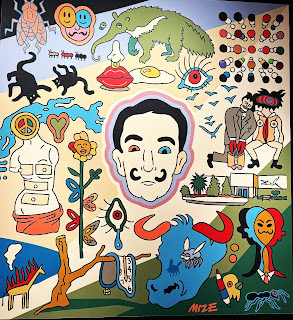Forster wrote "The Machine Stops" in 1909. Although the Wright Brothers had taken flight a few years earlier, it was a time when electricity was just becoming a part of people's lives. New homes were wired for power for wildly modern appliances like washing machines and vacuum cleaners. Radio broadcasts were still a thing of the future, but telephones were becoming commonplace. (Think party lines.) Yet Forster envisioned a world with technological capabilities much like those we have today, with frightening consequences.
The story begins in a room inhabited by a woman named Vashti. She is sitting in her chair listening to music when a bell rings. Her chair is mechanically rolled over to a console upon her command. She hits a button.
“’Who is it?’ she called. Her voice was irritable, for she had been interrupted often since the music began. She knew several thousand people; in certain directions human intercourse had advanced enormously.”
(We soon realize she “knows” almost all of these people exclusively through on-screen interactions in which they share their ideas. Ring any bells? Forster wrote, "The clumsy system of public gatherings had long since been abandoned.")
It's her son Kuno calling. She reluctantly tells him she can “isolate” herself for five minutes to talk with him. Time being at a premium, he cuts to the chase: he wants her to come visit. But why, she asks, when she can see him perfectly well on the screen? A physical visit will impinge upon her busy schedule. And she gets no "ideas" when traveling in an airship.
But Kuno prevails upon Vashti despite her terror of having "direct experience," not to mention being above ground for the first time in many years. (Yes, society is now underground, with visits to the surface available only to those who have received an Egression permit--and a respirator--from the Central Committee.)
When Vashti and Kuno meet, we realize they have diametrically opposed goals and views. Vashti is wholly with The Machine, which enables every aspect of their existence. While in your room, you need only ask for your bed or a bath or food, and it magically appears. If you have a problem, you report it to the Central Committee and the Mending Apparatus takes care of it. The Machine, like Oz, is all powerful, and human interaction via screen is wholly satisfying and efficient.
Kuno, however, wants to experience life first-hand. In fact, the reason he wants to see Vashti is to tell her he has gone to the surface -- without permission. But the Central Committee discovered his treason, of course, and has threatened him with Homelessness, i.e., being forced to the surface of the Earth without a respirator where, presumably, he will die a painful death. Vashti is ashamed at having borne such a son.
But to Kuno, the risk was worth it. It confirmed his antipathy to the world created by the Machine. "We created the Machine, to do our will, but we cannot make it do our will now," he says. "It has robbed us of the sense of space and of the sense of touch; it has blurred every human relation..."
And so the conflict is established between those who worship The Machine and those who resist its power.
I am reluctant to tell you more as this is a story you should read for yourself. But there is an additional passage particularly worth sharing that warns of the dangers of complacency.
As time progresses, the Machine begins to have some hiccups. Songs being play had random notes inserted; the beds no longer rose from the ground upon the push of a button. Reports were made to the Central Committee so these issues could be addressed.
"Time passed, and they resented the defects no longer. The defects had not been remedied, but the human issues in that latter day had become so subservient that they readily adapted themselves to every caprice of the Machine...All were bitterly complained of at first, and then acquiesced in and forgotten. Things went from bad to worse unchallenged."
freeFall Theatre's adaptation of "The Machine Stops" was quite faithful, complete with extensive passages directly from Forster's pages. And while I can understand why freeFall felt compelled to bring this work to life for theater-goers, I preferred the written version of the story. Reading it allowed me time to sit back and contemplate a particularly chilling passage and its parallels to today's society. I encourage you to read "The Machine Stops" yourself. It's in the public domain, and at just 30 pages, takes only an hour or so of our own busy lives.
And now, it's time to get out into the world. I might even leave my phone at home.


.jpg)


No comments:
Post a Comment